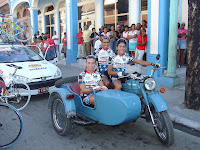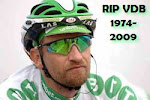 "Regardless of what you think of [Joe] Papp as a person, or how you rate him as a cyclist, whatever scorn he still faces should be countered by respect - or at least begrudging appreciation - for the man's willingness to immolate himself at the alter of clean-sport." - Me [Editor's Note: J. Danek = cousin to Joe Papp]
"Regardless of what you think of [Joe] Papp as a person, or how you rate him as a cyclist, whatever scorn he still faces should be countered by respect - or at least begrudging appreciation - for the man's willingness to immolate himself at the alter of clean-sport." - Me [Editor's Note: J. Danek = cousin to Joe Papp][In a recent email blast from Jim Ferstle, there was a reprint of post in which] Twisted Spoke presents an interesting take on the interview given by Pappillon's own Joe Papp to Bike Pure's Myles McCorry. Perhaps I say interesting because for once it's commentary devoid of hate or vitriol, though it is chock-full of disappointment. And rightly so, for Papp let down his legions of fans when it was revealed that he'd been doping for five years at the UCI level.
"One of the ironies about Papp is that reading his diary entries, he seemed like such a straightforward, honest guy. The opposite of Alejandro Valverde or Alexandre Vinokourov, the Spaniard loaded down with doping allegations, the Kazak defiant and unrepentant after his two year suspension. But when you hear Papp describe the rocket boost in performance, you understand the intensity of the temptation."
It just goes to show you that doping isn't confined to former Soviet republics or the clinics of modern Spain - or even to that most elite level of Grand Tour cycling - rarefied air once inhabited by the likes of Hamilton, Ullrich, Basso and Diluca.
Joe Papp was - and IS - a nice guy who loved racing his bike and writing about his adventures more than anything else in the world. I exchanged text messages with him before I went ahead with this post and he told me that one of the things he regrets most from doping (besides cheating his competitors, dishonoring his sport, humiliating his family, etc) was depriving you all, his readers (both of Pappillon and his cyclingnews.com diaries) the pleasure and momentary escape that came from reading about bike racing at the UCI level in far-off exotic locales... Vino' and others might dope for money; riders like Andreu might have doped just to be able to do their jobs; and then there are riders like Papp who - while earning an income from cycling, certainly - doped primarily to be able to continue in the sport they loved, when it was being overrun by athletes who were "on" full medical "programs." It doesn't excuse Joe's doping, but hopefully the Bike Pure interview, and Twisted Spoke's follow-up analysis, helps to contextualize it.
As Joe himself told me, "I miss competing in cycling more than anything - the training, the camaraderie, the travel, the chance to experience new cultures and exotic lands; representing my country (especially in the Pan Ams) and competing in the most beautiful sport in the world, still wide-eyed and with a shit-eating-grin plastered across my face. I'd give my left (ice)ball to be able to have a chance to set things right, but I fear that the only thing left for my with respect to cycling is to forever represent the 'This Could Happen to You' horror story that will be what coaches and uncorrupted directors and genuine, honest riders cite when encouraging young athletes to strongly reject doping as a means to success."
Let's hope that there is more to Papp's future than that...
Twisted Spoke's: Joe Papp fell off his bike, a casualty of the doping culture in cycling.
"His interview with Myles McCorry for Pezcycling is probably the best story I’ve read about how and why a rider crosses the line. You get all the angles, the rationales, naiveté, remorse and the painful aftermath wisdom that comes from first hand suffering.
We first discovered Joe Papp a few years ago when he wrote an engaging racing diary for cyclingnews. He wasn’t a famous rider competing in the big monuments of the sport but he was passionate about bike racing. He wrote well and had a skill for taking us inside the races, the personalities, the life of a pro racing gypsy, turning up in Cuba or Turkey or a smaller stage race in Italy or Spain.
So it was a mild shock to read he’s been doping for five years before he was caught and came clean. By the time of his failed drug test, he was doing his best to support the entire pharmacological industry — EPO, human growth hormone, testosterone, insulin, steroid and amphetamines. No doubt he popped a few aspirin, too.
The drug deal reached over 100 products, a program carefully managed by his Italian team — which would later deny any role or knowledge of Papp’s athletic enhancement. It feels like a very old story that never changes — from the Festina Affair to Operacion Puerto.
One of the ironies about Papp is that reading his diary entries, he seemed like such a straightforward, honest guy. The opposite of Alejandro Valverde or Alexandre Vinokourov, the Spaniard loaded down with doping allegations, the Kazak defiant and unrepentant after his two year suspension. But when you hear Papp describe the rocket boost in performance, you understand the intensity of the temptation.
“At first it brought me back up to my previous level of competitiveness, but the more I took that’s when I moved up a level- it felt amazing. 12 or 13% — enough of a difference to block out any ethical or health issues. Enough to win.” When a rider as thoughtful and articulate as Papp decides to dope, you realize how easily a younger athlete is lead to the needle.
It also nearly killed him. While awaiting his B sample test results, Papp crashed hard in the Tour of Turkey. At the hospital they removed “a mass of EPO-damaged sludge” from his left buttock. Doctors back in the states told Papp the blender mix of blood thinners and EPO could have easily killed him. That was certainly the terminal effect on his cycling career.
Once caught, Papp hoped lawyers would somehow locate the Hail Mary loophole but the endgame was not different than Floyd Landis or Tyler Hamilton: destroyed reputation, broken marriage, financial hardship and depression. A UCI ban was the least of his problems. It’s like the old Neil Young song — “I’ve seen the needle and the damage done. A little part of it in everyone. But every junkie’s like a setting sun.”
UCI anti-doping queen Annie Gripper says they’re winning the war on doping. Articulate and visionary team directors like Garmin’s Jonathan Vaughters think the biological passport is a huge step toward clean cycling. It’s a long hard climb, maybe tougher than Alpe d’Huez. “You can change behavior quickly but the deep culture will take a few more years yet,” said Gripper.
In an article about Lance Armstrong in this week’s New York Times, there was a reminder of that pervasive culture. “Five of the eight riders who shared the Tour podium with Armstrong in his winning years served doping bans at some point in their careers. Another two were allegedly tied to doping rings.” Those are not percentages you build a cleaner sport on.
We wish Joe Papp well. Like the NFL players who sell their ligaments, bones and risk life long damage from multiple concussions to make a living, Papp found himself caught in the grinder. He seems like a good guy that loved cycling too much. He wanted to be at the front of the climb and decided there was only one way to do that." - Twisted Spoke
For Bike Pure, Myles McCorry wrote of his interview with Joe:
"I witnessed a rider recovering from years stuck in a system where cheating and lying are not only the norm but pampered and encouraged. To recover one self-belief and ones honour is an individual battle. We can only judge on the harm Joe has done to the sport and his efforts for reparation."
 Likewise, [as his cousin] I've heard Joe's lectures to university students at such schools as Chatham and Slippery Rock, and know that the presentation he gave at the headquarters of USADA this summer was considered by several staff members there to be the most-engaging, authentic, and motivating interaction they'd ever had with a reformed-doper who was accepting responsibility for the terrible things he did, and was actively working to prevent other young athletes from following the same dark road on which he lost himself. Regardless of what you think of Papp as a person, or how you rate him as a cyclist, whatever scorn he still faces should be countered by respect - or at least begrudging appreciation - for the man's willingness to immolate himself at the alter of clean-sport.
Likewise, [as his cousin] I've heard Joe's lectures to university students at such schools as Chatham and Slippery Rock, and know that the presentation he gave at the headquarters of USADA this summer was considered by several staff members there to be the most-engaging, authentic, and motivating interaction they'd ever had with a reformed-doper who was accepting responsibility for the terrible things he did, and was actively working to prevent other young athletes from following the same dark road on which he lost himself. Regardless of what you think of Papp as a person, or how you rate him as a cyclist, whatever scorn he still faces should be countered by respect - or at least begrudging appreciation - for the man's willingness to immolate himself at the alter of clean-sport.












I don't think that guy knows what the word "immolate" means.
ReplyDeleteThanks,
Burt
Maybe he meant, "to sacrifice, to offer in sacrifice, or to destroy by fire (in order to purify or cleanse?) [the corrupt sport of cycling, so that douchebags like Burt and CFA (JK) can recapture their love of professional cycling - a cycling free from the worst of the doping crimes?]"
ReplyDeleteJust saying...